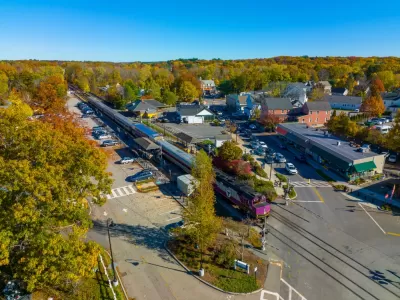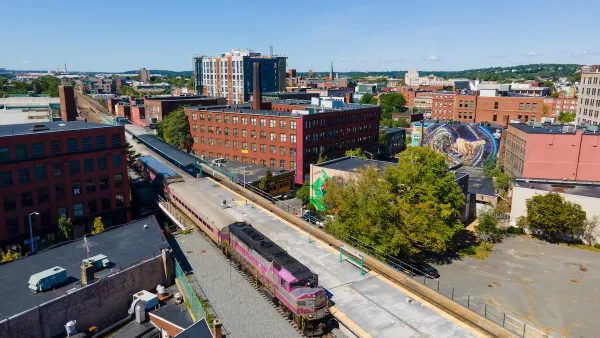Cities and towns had until January 31 to submit their draft plans for rezoning areas near transit stations to comply with a new state law.

According to an article by Christian MilNeil in Streetsblog Mass, 175 Massachusetts municipalities had until yesterday to submit plans complying with the state’s new transit-oriented development (TOD) law, which requires them to submit non-binding ‘action plans’ identifying proposals for legalizing multifamily zoning to support increased housing production near transit stations.
“Where many suburbs currently only allow single-family homes with large lawns, the new rules will require new zoning districts ‘of reasonable size,’ and generally within a half-mile of transit stops, where builders would be allowed to construct at least 15 homes per acre,” MilNeil explains. Noncompliance would bar cities and towns from receiving certain state funding.
As many housing advocates point out, zoning reform is just the first step toward more housing production, and market conditions and other factors will also dictate where and how much housing gets built. In the Town of Weston, one of the “exclusionary suburbs” required to submit a plan, members of the town’s Housing Production Plan Implementation Committee “raised the point that simply creating a new zoning law to comply with the new state rules need not necessarily lead to more housing on the ground.”
An article from last September expressed concerns that the service disruptions and other problems experienced by the Massachusetts Bay Transportation Authority (MBTA) in the last few years could hinder TOD, but advocates remain hopeful that the agency will make the necessary improvements to effectively serve the region.
FULL STORY: Suburbs Face Their First Deadline for New Transit-Oriented Zoning Law

Planetizen Federal Action Tracker
A weekly monitor of how Trump’s orders and actions are impacting planners and planning in America.

Maui's Vacation Rental Debate Turns Ugly
Verbal attacks, misinformation campaigns and fistfights plague a high-stakes debate to convert thousands of vacation rentals into long-term housing.

San Francisco Suspends Traffic Calming Amidst Record Deaths
Citing “a challenging fiscal landscape,” the city will cease the program on the heels of 42 traffic deaths, including 24 pedestrians.

Amtrak Rolls Out New Orleans to Alabama “Mardi Gras” Train
The new service will operate morning and evening departures between Mobile and New Orleans.

The Subversive Car-Free Guide to Trump's Great American Road Trip
Car-free ways to access Chicagoland’s best tourist attractions.

San Antonio and Austin are Fusing Into one Massive Megaregion
The region spanning the two central Texas cities is growing fast, posing challenges for local infrastructure and water supplies.
Urban Design for Planners 1: Software Tools
This six-course series explores essential urban design concepts using open source software and equips planners with the tools they need to participate fully in the urban design process.
Planning for Universal Design
Learn the tools for implementing Universal Design in planning regulations.
Heyer Gruel & Associates PA
JM Goldson LLC
Custer County Colorado
City of Camden Redevelopment Agency
City of Astoria
Transportation Research & Education Center (TREC) at Portland State University
Jefferson Parish Government
Camden Redevelopment Agency
City of Claremont





























